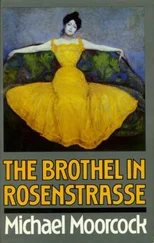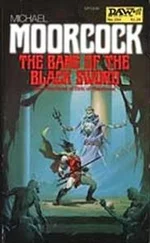Michael Moorcock - Behold the Man
Здесь есть возможность читать онлайн «Michael Moorcock - Behold the Man» весь текст электронной книги совершенно бесплатно (целиком полную версию без сокращений). В некоторых случаях можно слушать аудио, скачать через торрент в формате fb2 и присутствует краткое содержание. Жанр: Фантастика и фэнтези, на английском языке. Описание произведения, (предисловие) а так же отзывы посетителей доступны на портале библиотеки ЛибКат.
- Название:Behold the Man
- Автор:
- Жанр:
- Год:неизвестен
- ISBN:нет данных
- Рейтинг книги:5 / 5. Голосов: 1
-
Избранное:Добавить в избранное
- Отзывы:
-
Ваша оценка:
- 100
- 1
- 2
- 3
- 4
- 5
Behold the Man: краткое содержание, описание и аннотация
Предлагаем к чтению аннотацию, описание, краткое содержание или предисловие (зависит от того, что написал сам автор книги «Behold the Man»). Если вы не нашли необходимую информацию о книге — напишите в комментариях, мы постараемся отыскать её.
Behold the Man — читать онлайн бесплатно полную книгу (весь текст) целиком
Ниже представлен текст книги, разбитый по страницам. Система сохранения места последней прочитанной страницы, позволяет с удобством читать онлайн бесплатно книгу «Behold the Man», без необходимости каждый раз заново искать на чём Вы остановились. Поставьте закладку, и сможете в любой момент перейти на страницу, на которой закончили чтение.
Интервал:
Закладка:
"I do."
"Well, you'll never find out, will you?"
"Sit down, my son," said the rabbi. "What do you wish to ask of us?"
"Where is Christ?" he said. "Where is Christ?" They did not understand the language.
"Is it Greek?" asked one, but another shook his head.
Kyrios; The Lord.
Adonai: The Lord.
Where was the Lord?
He frowned, looking vaguely about him.
"I must rest," he said in their language.
"Where are you from?" He could not think what to answer.
"Where are you from?" a rabbi repeated.
"Ha-Olam Hab-bah..." he murmured at length' They looked at one another. "Ha-
Olam Hab-bah" they said.
Ha-Olam Hab-bah; Ha-Olam Haz-zeh: The world to come and the world that is.
"Do you bring us a message?" said one of the rabbis.
They were used to prophets, certainly, but none like this one. "A message?"
"I do not know," said the prophet hoarsely. "I must rest.
I am hungry."
"Come. We will give you food and a place to sleep." He could only eat a little of the rich food and the bed with its straw-stuffed mattress was too soft for him. He was not used to it.
He slept badly, shouting as he dreamed, and, outside the room, the rabbis listened, but could understand little of what he said.
Karl Glogauer stayed in the synagogue for several weeks.
He would spend most of his time reading in the library, searching through the long scrolls for some answer to his dilemma. The words of the Testaments, in many cases capable of a dozen interpretations, only confused him further.
There was nothing to grasp, nothing to tell him what had gone wrong.
The rabbis kept their distance for the most part. They had accepted him as a holy man. They were proud to have him in their synagogue. They were sure that he was one of the special chosen of God and they waited patiently for him to speak to them.
But the prophet said little, muttering only to himself in snatches of their own language and snatches of the incomprehensible language he often used, even when he addressed them directly.
In Nazareth, the townsfolk talked of little else but the mysterious prophet in the synagogue, but the rabbis would not answer their questions. They would tell the people to go about their business, that there were things they were not yet meant to know. In this way, as priests had always done, they avoided questions they could not answer while at the same time appearing to have much more knowledge than they actually possessed.
Then, one sabbath, he appeared in the public part of the synagogue and took his place with the others who had come to worship.
The man who was reading from the scroll on his left stumbled over the words, glancing at the prophet from the corner of his eye.
The prophet sat and listened, his expression remote.
The Chief Rabbi looked uncertainly at him, then signed that the scroll should be passed to the prophet. This was done hesitantly by a boy who placed the scroll into the prophet's hands.
The prophet looked at the words for a long time and then began to read. The prophet read without comprehending at first what he read. It was the book of Esaias.
The Spirit of the Lord is upon me, because he hath anointed me to preach the gospel to the poor; he hath sent me to heal the broken-hearted, to preach deliverance to the captives, and recovering of sight to the blind, to set at liberty them that are bruised, to preach the acceptable year of the Lord. And he closed the book, and gave it again to the minister, and sat down. And the eyes of all of them that were in the synagogue were fastened on him.
(Luke 4:18-20)VI
They followed him now, as he walked away from Nazareth towards the Lake of Galilee. He was dressed in the white linen robe they had given him and though they thought he led them, they, in fact, drove him before them.
"He is our messiah," they said to those that inquired.
And there were already rumors of miracles.
When he saw the sick, he pitied them and tried to do what he could because they expected something of him.
Many he could do nothing for, but others, obviously in psychosomatic conditions, he could help. They believed in his power more strongly than they believed in their sickness.
So he cured them.
When he came to Capernaum, some fifty people followed him into the streets of the city. It was already known that he was in some way associated with John the Baptist, who enjoyed huge prestige in Galilee and had been declared a true prophet by many Pharisees. Yet this man had a power greater, in some ways, than John's. He was not the orator that the Baptist was, but he had worked miracles.
Capernaum was a sprawling town beside the crystal lake of Galilee, its houses separated by large market gardens.
Fishing boats were moored at the white quayside, as well as trading ships that plied the lakeside towns. Though the green hills came down from all sides to the lake, Capernaum itself was built on flat ground, sheltered by the hills. It was a quiet town and, like most others in Galilee, had a large population of gentiles. Greek, Roman and Egyptian traders walked its streets and many had made permanent homes there. There was a prosperous middle-class of merchants, artisans and ship-owners, as well as doctors, lawyers and scholars, for Capernaum was on the borders of the provinces of Galilee, Trachonitis and Syria and though a comparatively small town was a useful junction for trade and travel.
The strange, mad prophet in his swirling linen robes, followed by the heterogeneous crowd that was primarily composed of poor folk but also could be seen to contain men of some distinction, swept into Capernaum. The news spread that this man really could foretell the future, that he had already predicted the arrest of John by Herod Antipas and soon after Herod had imprisoned the Baptist at Peraea. He did not make the predictions in general terms, using vague words the way other prophets did. He spoke of things that were to happen in the near future and he spoke of them in detail.
None knew his name. He was simply the prophet from Nazareth, or the Nazarene. Some said he was a relative, perhaps the son, of .a carpenter in Nazareth, but this could be because the written words for "son of a carpenter" and "magus" were almost the same and the confusion had come about in that way. There was even a very faint rumor that his name was Jesus. The name had been used once or twice, but when they asked him if that was, indeed, his name, he denied it or else, in his abstracted way, refused to answer at all.
His actual preaching tended to lack the fire of John's.
This man spoke gently, rather vaguely, and smiled often.
He spoke of God in a strange way, too, and he appeared to be connected, as John was, with the Essenes, for he preached against the accumulation of personal wealth and spoke of mankind as a brotherhood, as they did.
But it was the miracles that they watched for as he was guided to the graceful synagogue of Capernaum. No prophet before him had healed the sick and seemed to understand the troubles that people rarely spoke of. It was his sympathy that they responded to, rather than the words he spoke.
For the first time in his life, Karl Glogauer had forgotten about Karl Glogauer. For the first time in his life he was doing what he had always sought to do as a psychiatrist.
But it was not his life. He was bringing a myth to life a generation before that myth would be born. He was completing a certain kind of psychic circuit. He was not changing history, but he was giving history more substance.
He could not bear to think that Jesus had been nothing more than a myth. It was in his power to make Jesus a physical reality rather than the creation of a process of myth genesis.
Читать дальшеИнтервал:
Закладка:
Похожие книги на «Behold the Man»
Представляем Вашему вниманию похожие книги на «Behold the Man» списком для выбора. Мы отобрали схожую по названию и смыслу литературу в надежде предоставить читателям больше вариантов отыскать новые, интересные, ещё непрочитанные произведения.
Обсуждение, отзывы о книге «Behold the Man» и просто собственные мнения читателей. Оставьте ваши комментарии, напишите, что Вы думаете о произведении, его смысле или главных героях. Укажите что конкретно понравилось, а что нет, и почему Вы так считаете.









